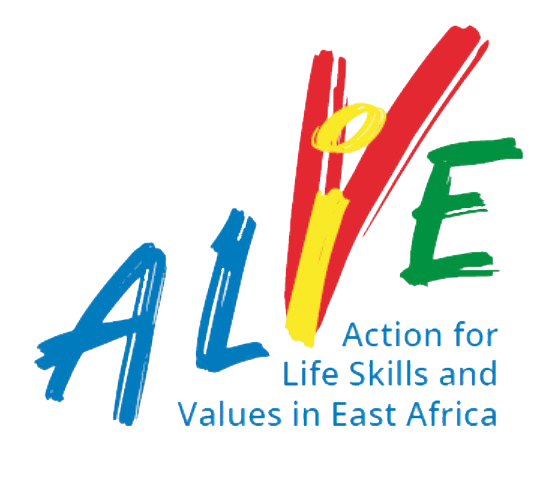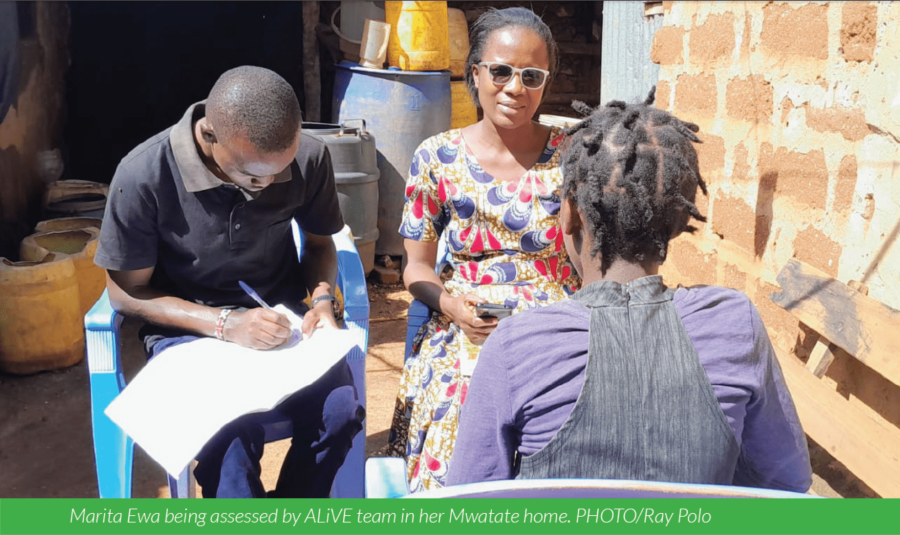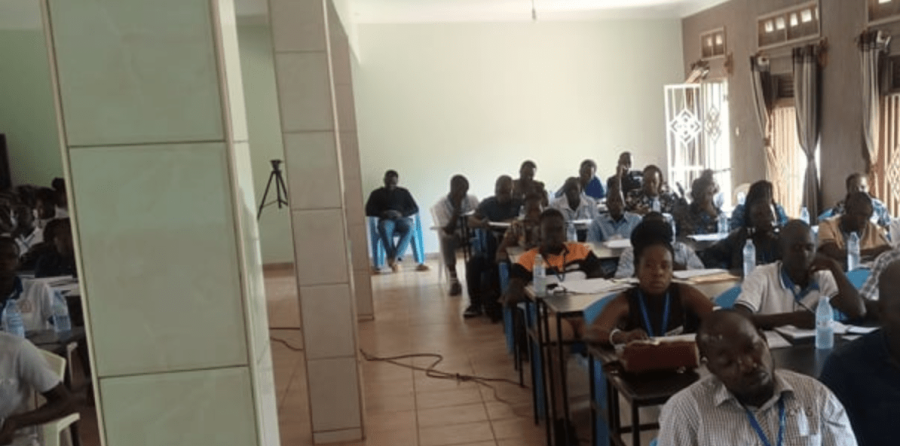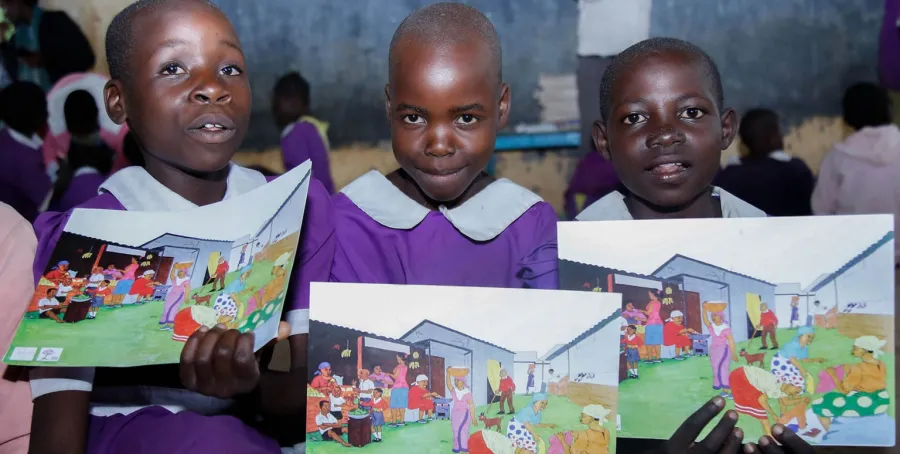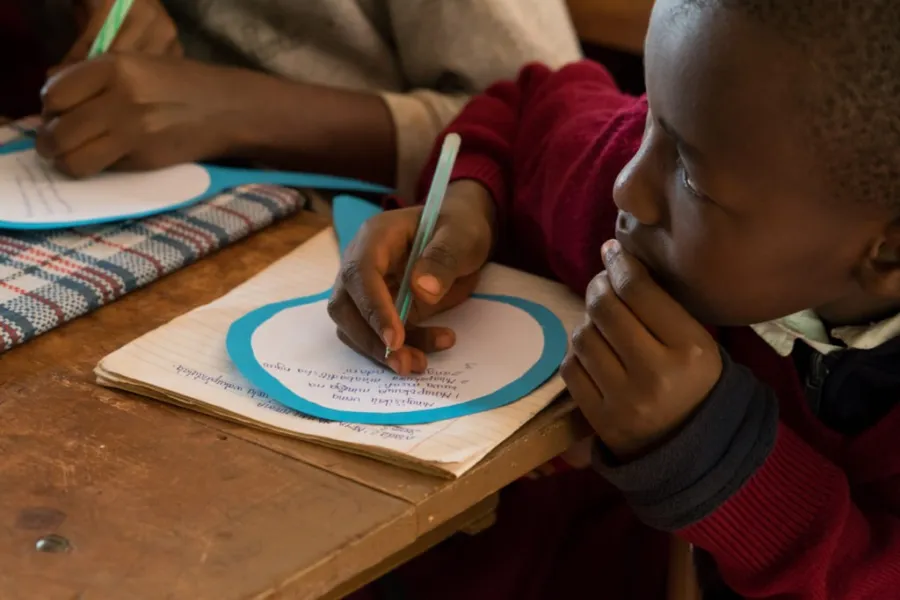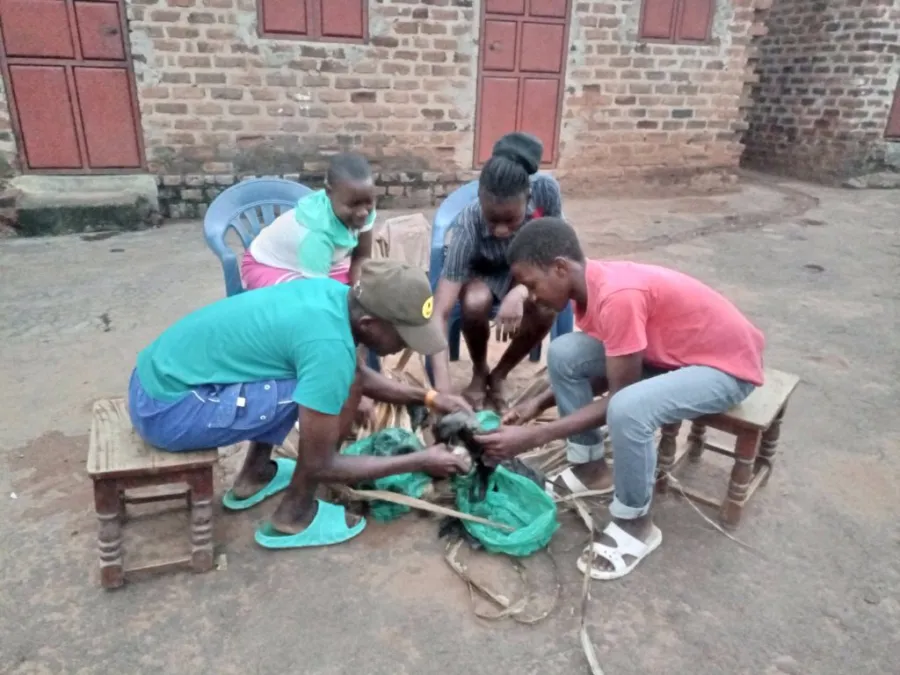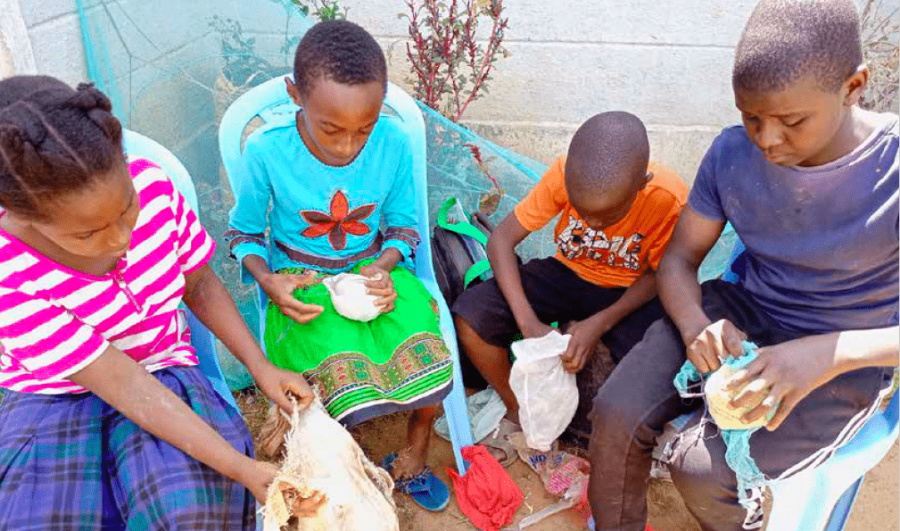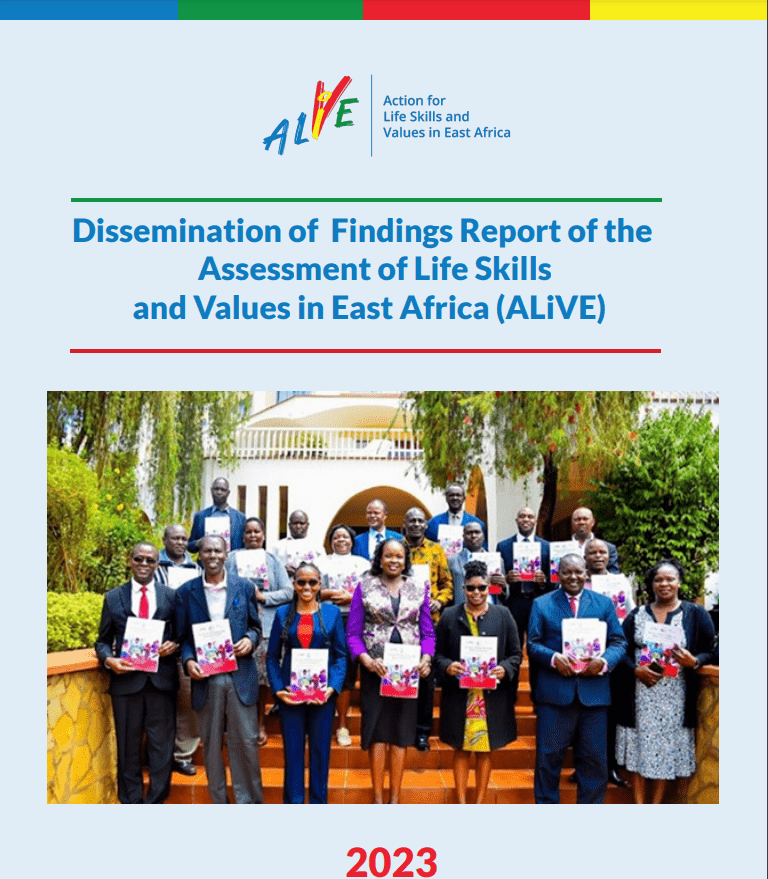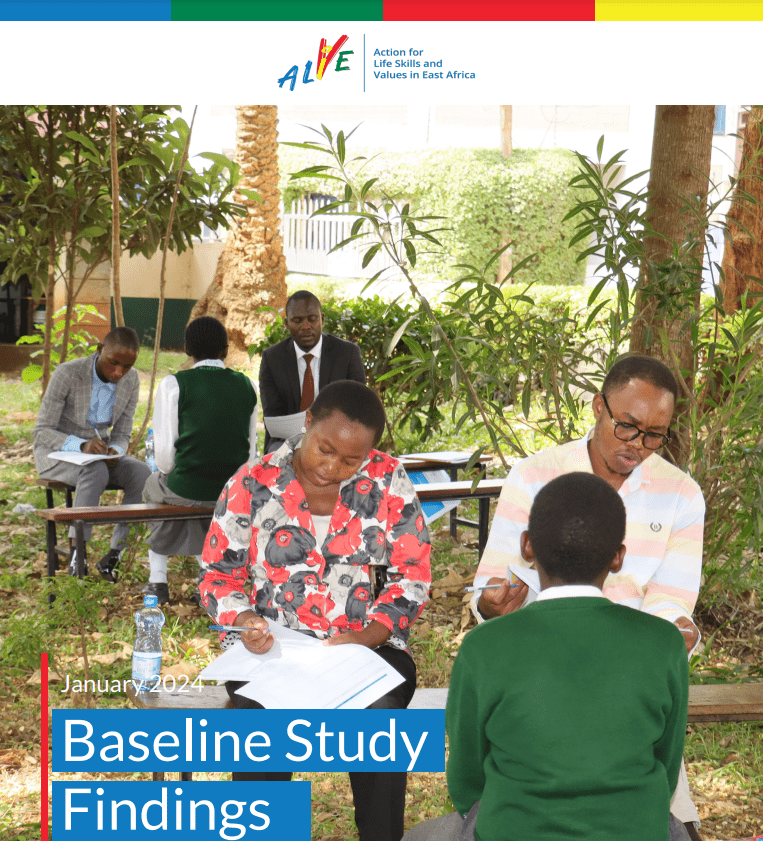Employing Green Solutions Against Hunger, Taveta Teen Embraces Life Skills and Values to Support Family Tucked away behind some shops in Mwatate town, is Kariobangi village. We discover young Marita Ewa watering a tiny kitchen garden. Her forte is tender care. Every dry morning, she wakes up to her tools: a water jug and a hand-sized watering can, which she cut from a plastic bottle. She has perforated the can just enough to sprinkle water on her delicate beans and tree seedlings. Leaning on their weakening wood fence are two stalks of sugarcane, which she also planted recently. The 13-year-old girl is busy greening her space, and her brain too. Apparently, what remains hungry on the day of our visit is her resilient tummy. Their level of lack is loud. Lunch time is not necessarily food time. Even their saucepans hung hungrily on the emaciated kitchen walls. They are just sooty, not soupy. The traditional stone stove is cold and quiet! The only visible smoke oozes out of a kerosene-starved lantern lamp, locally known as koroboi. It is infamous for its sooty embers and for gobbling-off kerosene budgets from needy pockets. Nonetheless, it is the only light that shines Ewa’s education path. Although it is daytime, Ewa must light her lamp to see. Her house is dark. The corner kitchen is shy of windows, the dots of light that land on the empty table and the floor, only peep through some roof holes. The roofing sheets are rusted and tired. Occasionally, rainwater seeps through them, which has worked against the gapping walls in the kitchen, now bending on an adjacent brick wall of a neighbour. Nonetheless, young Ewa reads on. She has brought a long a friend to meet her guests (the ALiVE Team), who are assessing life skills and values among adolescents in the Taita Taveta County. Both welcome us with amiable respect and sweet coastal Kiswahili accent. They lend me one of the two chairs in the room. I regrettably decline as I must follow through with my documentation assignment. Ewa sits and welcomes her friend to revise with her. The young orphan has been topping her class despite her pile of socio-economic predicaments. “Term one she was number two in her class. She is a hardworking girl who understands my struggles,” Ewa’s aging grandma, Nana, says with a hopeful smile. Resilience is their creed. They join forces to battle poverty with their sweat. As Nana goes fending for the family, Ewa helps with house chores before she settles down to study. “I don’t have to tell her what to do. She knows she has a role to help around and to read her books. Poverty is a language that my granddaughter understands very well, so she digs into her books like they are her sole life spring. I am proud of her for that. Sometimes she helps me with beadwork and pottery, which I sell to meet our needs,” Nana adds Poverty is a language that my granddaughter understands very well, so she digs into her books like they are her sole life spring. I am proud of her for that. Sometimes she helps me with beadwork and pottery, which I sell to meet our needs,” Nana adds. “I would like to be a doctor. I know education will give Nana and I a better life. That is why I love my books,” a focused Ewa affirms. Ewa just like any child has a right to quality education. She has the will to thrive in and out of class. She paints a positive picture of adolescents who are not only going through school, but also acquiring critical life skills and values both at home and at school. This aligns to the vision of Action for Life Skills and Values in East Africa (ALiVE), which aims to ensure that learners acquire 21st century skills and values that would enable them to learn and thrive at school, at work and later in life. ALiVE carries out assessments on life skills and values. In 2022, ALiVE conducted a large-scale assessment across East Africa, covering Kenya, Uganda, Tanzania, and Zanzibar. The findings indicated that only 5% of adolescents assessed in Kenya, had proficiency in problem solving skills. Read the full report here. The results show that most adolescents are not functioning at particularly high levels in the skills and the value assessed. The findings informed the need to contribute to nurturing and assessing life skills in the region. As such ALiVE has continued to develop assessment tools and conduct periodic assessments across East Africa. In April 2024, ALiVE team in Kenya did assessments in Nyeri, Kisumu and Taita Taveta Counties. Adolescents aged between 13-17-year-olds were assessed on their proficiency in problem solving, self awareness, collaboration, and respect. The exercise targeted 1,125 households, with an aim to assess two adolescents per household on their skills in problem solving, self-awareness and the value of respect. The adolescents were then placed in groups to assess their collaboration skills. As we seek to analyse the findings of the assessments conducted in 2024, it will be interesting to note any deviation from the previous findings in 2022. ALiVE encourages stakeholders especially caregivers and teachers, to help children grow better by nurturing in them life skills and values. During the April assessments in Kenya, ALiVE team shared customized calendars which were issued to caregivers, to help them appreciate and support learners nurture requisite life skills and values. Ewa is one of the adolescents who were assessed in Taita Taveta County. After a half an hour of the assessment, we left behind a teenager and a grandmother who face life with rare optimism. We appreciate the bond between the two and hope that our interaction with them will help to solidify their cause in enhancing values and life skills. Ewa has demonstrated her worth. She has exhibited observable abilities in problem solving and collaboration skills through her daily chores and encounters. Need I add that Ewa sounds like hewa,
A new education assessment is being conducted with 1,050 Uganda adolescents to determine if they have the necessary skills and tools to navigate the challenges of the world. The participants are persons aged 13 to 17 both in and out of school. They are selected from 75 enumeration areas in Oyam, Jinja and Kasese districts. What we are doing currently is testing the tool. Data that will be genearted from this assessment will help us to improve the tool, and it will also help us to generate evidence on how life skills can be assessed. Ms Kandy Alum, ALiVE coordinator in Oyam District. Generic skills or soft skills are a critical area of a learner’s education right from the beginning because it is going to format this learner into a person with a unique personality. We are having a tool that was developed for the global North to put them in use within the region and yet we needed tools that are developed by us and for us that really depict a true picture of an East African in relation to life skills and values. Ms Faridah Nassereka, ALiVE senior program officer. Read full article here
The power of collaboration yields endless potential! That is why Action for Life Skills and Values in East Africa (ALiVE) believes in partnerships as it drums efforts to ensure that learners in East Africa acquire core competencies necessary to live and thrive. In January 2024, ALiVE convened a regional co-creation workshop, in Murang’a County in Kenya. The workshop, supported by Co-Impact, brought together both state and non state actors who are key in the education sector in East Africa (Kenya, Uganda and Tanzania), various government ministry officials, civil society organizations, research institutions, educators from Kenya, Tanzania, Uganda, a member of parliament from Tanzania, and some development partners graced the deep weeklong conversations regarding core competencies (life skills, generic skills and values). ALiVE has since began follow up sessions with critical stakeholders to prioritize roles and aspects to leverage through system mapping of key actors. Currently, the cover modules of systems of today have been finalized as well as political mapping in East Africa. The ALiVE team is now using the insights as they engage through the system shift. Dr. John Mugo, the Executive Director of Zizi Afrique Foundation, and Principal Investigator for the ALiVE initiative, noted that CBC is better placed to instil life skills and values among young learners if properly implemented. He decried the gap that still exists in parental engagement, adding that it impedes the nurturing of life skills and values among learners. The competency-based curricular are no doubt taking shape in Kenya, Uganda, Tanzania, and Zanzibar, where ALiVE’s footprints currently punch advocacy grounds to push for the integration of core competencies. However, there still exists a yawning gap in assessment, which ALiVE endeavours to fill. “Yes, these skills may be covered by the curriculum, we may have teachers teaching them but how can we tell whether learners are acquiring the desired skills? The only way is to have an assessment system that checks on the skills and that is where ALiVE comes in,”explained Dr. Nakabugo. ALiVE is seeking solutions to the emerging systemic questions by widening its collaborative net. We believe that the strength and outcomes of any education system, significantly depends on the quality of teaching. The big question is, are we preparing teachers well enough to competently journey with the 21st century learner? Are the teacher training curricular incorporating the changes and setting teachers to deliver competency-based outcomes that are envisioned in the respective East African countries? Currently, ALiVE is extending a partnership branch to teacher training institutions, to support teacher educators in shaping frameworks that enhance integration of core competencies at the teacher level with an aim of ensuring the fruits trickle down to the learners. In Kenya, ALiVE has an ongoing collaboration with Strathmore University, Kenyatta University, Machakos and Eregi teacher training colleges. In Uganda, the partnership runs with Makerere University, Kyambogo University, and Luigi Institute of Higher Education. Similar collaborative work is also happening in Tanzania with the University of Dar Es Salaam and the State University of Zanzibar. In these jurisdictions, ALiVE is cocreating with teacher educators strategies for assessing and nurturing life skills and values. ALiVE is also partnering with examination councils and boards in Kenya Uganda and Tanzania, to share experiences, lessons, frameworks, and structures to be able to see what we can learn and what we can lend to the larger government education systems, within the context of core competencies. ALiVE is alive to the fact that several other countries, especially in the Western counties, have produced assessment tools, but none has been contextualized for East Africa. That is why the initiative is building a resource pool of local experts through its learning hub. There is always power in converging and thinking together to co-create. We are gaining a deep understanding of how education systems work and how the shifts we desire can be achieved through the same systems. We call upon all stakeholders: the government, parents, opinion leaders, civil society, and the media, to play their role to ensure our children acquire life skills and values. By Raynor Osare, Judith Nyakaisiki and Greyson Mgoi
Education stakeholders are convening at the KCB Leadership Centre for the 5th Country Convention of the Regional Education Learning Initiative (RELI), a collaborative network of over 70 organizations working on improving learning outcomes in East Africa. Over the last five years, this annual event has provided education stakeholders an opportunity to address educational priority issues by taking stock of progress, achievements, and successes as well as challenges for realizing access to equitable education for the children furthest left behind. The theme this year is ‘RELI @5: Taking stock to inform the future of Education’. And for the next three days, delegates are set to review the contributions made by the network towards the improvement of education in Kenyan and East Africa, outline education sector priorities, chart the way forward and develop a strategy for the coming years. The convening draws from a dynamic group of stakeholders including policymakers, civil society, and development partners. It aims to provide an opportunity to engage with one another, share knowledge and good practice, and explore trends and innovative approaches that can be implemented to develop sustainable and inclusive education systems. The RELI Country convening will be structured around the following themes:Status of Education in Kenya drawing from Lessons learned in the past five years.The status of realization of special needs education in Kenya? And why is it critical that it is prioritized?The status of education policy implementation in Kenya and the challenges still exist when it comes to implementation of education policies.The status of Implementation of the Competency Based Curriculum and the looming crisis of double transition come 2023.The status of TVET in Kenya and its critical role to Youth development and well-being. For the next three days, we will endeavor to answer the following 5 questions. What is the status of education in Kenya? What is the role of the Kenyan child, parent and teacher and how do we amplify their voices? What are the key concerns that currently exist? What solutions can we collectively formulate? And finally, what role does each stakeholder have to play in changing the narrative?
The Teacher’s Development and Support cluster members learned about TaRL through a project that was implemented by Uwezo Tanzania, the results of which showed that TaRL is an innovative approach that can be adapted to local contexts and can be used by teachers to support learners who have been left behind. We would never have learned about it without RELI. For the past five years RELI has demonstrated the power of working through a network and what can be achieved through a collective effort. The network has proved to be particularly relevant in difficult times, such as the covid-19 pandemic. Members of the Teachers Development and Support cluster (TDS) were able to come together and craft resources to help children learn and strive in school and even at home. The first induction and introduction session was conducted in April 2019 in Dodoma. With the help of Sara Ruto and Zaida Mgalla (Uwezo Tanzania), a team from PAL network, which included Winny Cherotich (Kenya), Elizabeth Ndyanabangi (Uganda) and Armando Ali (Mozambique), introduced the TaRL Approach to RELI Tanzania. One induction training participant, Shadidu Ndosa said, “it was a wonderful introduction to TaRL and we learned step by step how the foundational literacy and numeracy can be taught effectively to children left behind in mainstream classes”. Immediately after the induction session, TDS decided to contextualise TaRL resources into local language and to use more contextualised examples. Soon the idea to develop resources, training manuals, and frameworks emerged. A committee of three people was formed; Zaida Mgalla, Maryam Ismail and Shadidu Ndosa built upon what emerged during the Dodoma session. By October 2019, drafts of stories that were written during the event were collected and by early 2020, TDS had about 60 stories and a TaRL toolkit ready for piloting in primary schools. The contextualization process “was incredibly hard work but we finally managed to contextualize TaRL into what we call Jifunze in Kiswahili” said Maryam Ismail. Between May 2019 and September 2020, HakiElimu hosted RELI members as we worked to develop resources for printing and digitisation in collaboration with Uwezo Tanzania, which acted as technical lead. The digitisation of Aya stories, one paragraph-long stories used to improve the foundational literacy of learners, was done using the expertise of Shuledirect staff. In 2021, the digitised Aya stories were piloted in Global Action Week for Education (GAWE) in Rorya district. The contextualization exercise was led by trained TaRL champions who invited other members to learn in the process. Members reviewed the resources and made necessary adjustments, translations and prepared a ready to print version of literacy and numeracy teaching manuals. Following the development of the resources, TDS decided to showcase and demonstrate the impact of the TARL resources at different educational events, including the innovation week held in April 2021 in Dar es Salaam and the improvising teaching resources event held at State University of Zanzibar. The demonstration of TaRL in these events communicated a clear message to the Ministry of Education and the Permanent Secretary in Zanzibar that the ministry should adopt TaRL as a key teaching resource for supporting learners left behind. Following the success of the TaRL resources more RELI members have enrolled into TaRL training, organised by TaRL Africa and impressively, four members from Zanzibar completed the training. On the Tanzania mainland, TaRL has been earmarked as one of the resources in the teachers continuous professional development plan to be implemented to all teachers led by Tanzania Institute of Education. In thinking about the future of this initiative, we hope to advocate for the adoption of TaRL into teachers’ training colleges and member organisations – institutions which are well placed to support its roll out as an important resource for teachers’ continuous professional development. One master trainer at the Zanzibar event said “teachers were excited to learn TaRL; they started slowly but then they picked up quickly; asked more questions as they went so that to be clear with approach and TaRL procedure. Interestingly, the trained teachers organized themselves as part of assignment to train their fellow teachers and 75 % of the teachers trained 2 teachers in their schools. In some of the schools they trained more than 5 teachers and others trained all teachers. The most interesting thing while they implemented this program is that pupils’ interest in learning increased as they always remind and insist their TaRL teachers to learn and sing and doing fun games.” We are looking forward to the next five years when we hope our approach will be fully adapted and integrated into teacher training curriculum and teachers’ continuous professional development for in-service teachers.
Currently, Kenyans are debating the value of the Competence Based Curriculum (CBC). Some support it while others are pointing out the gaps that exist. However, missing from this debate, is a consideration of the core-competences – the skills needed by learners to help them make informed decisions and potentially live a thriving life. This skills include critical thinking and problem solving, collaboration and communication, imagination and creativity, self-efficacy, learning to learn, citizenship and digital literacy. Researchers have made it clear that these competencies are necessary for our children to survive in a world that is uncertain and afflicted by many challenges in the wake of globalization and digitalization. A study done by Regional Education Learning Initiative in Kenya showed that only five percent of our adolescents aged 13-17 years demonstrated the highest proficiency level in problem-solving skills. In other words, if you have a class with 20 children and a problem arises only one of them has the capacity to get out of the problem or even support others in finding a solution. The findings are shocking and a wake up call for all of us to act. It is therefore not surprising that university graduates find it hard to get a job, while on the other hand employers say they cannot find employees with the right skill set for employment. Under the past curriculum, the teacher had the monopoly of knowledge. Although they used child-centred pedagogical approaches, they still did not encourage learners to ask questions. Sadly, more often than not, learners who asked many questions or challenged their teachers in any way, were bullied and labelled as indisciplined. It is therefore not surprising that learners aged 13-17 years – the majority of whom are learning under the old 8-4-4 curriculum are undequipped to solve the challenges afflicting our country today. McKinsey Global Institute’s research report indicated that higher cognitive skills (eg. problem solving and critical thinking), and social and emotional capacity to be adaptable (eg advanced communication, empathy), and the ability to learn continuously and learn technological skills (eg digital literacy and data analysis) are the top three skill sets workers will need to secure the best careers in the future. This research therefore calls Kenyans to reflect on what needs to be done to prepare our children for the future. Parents must be at the forefront of developing these core competences at home. Parents can nurture these competenvies in their children by, for example, allowing their children to share ideas openly at home or in family meetings, letting them solve some of their problems without feeling like they always have to intervente, and allowing them to get their hands dirty by collecting garbage in the community market. Additionally, the role of teachers in developing these competencies cannot be overemphasized. But teaching these skills means they will to put the blackboard and chalk down, instead teach through practical activities. We need a more active form of learning where learners are co-creating their learning experiences and the teacher acts as a facilitator and role model. Moreover teachers and parents need to work together to nurture and develop these core competencies. Children go between home and school and learning and development take place in both spaces. As such these are the best places to begin to develop, nurture and sustain the skils. Therefore teachers and parents can completement each others efforts for the benefit of the children. It is time for all of us to take action to collaboratively nurture core competencies. Most of the people – teachers and parents – who are best positioned to teach Kenyan children these important skills do not know their roles. That is where we can step in. We can all get involved in communicating about the importance of nurturing core competencies to parents, teachers, schools and communities. We can all start now.
The Assessment of Life Skills and Values in East Africa (ALiVE) team recently released its Do our children in Kenya have Life Skills and Values? report which shares findings about Kenyan adolescents’ proficiency in four key life skills: problem solving, self-awareness, collaboration and respect. The research team assessed a total of 17,276 adolescents, aged 13-17 years old from 14,197 households… Only five percent of the adolescents are proficient in problem solving (Level 4) Overall, only nine percent of the adolescents are proficient in self-awareness (Level 3) Only six percent of the adolescents express high respect for others Overall, only one in ten of the adolescents are proficient in collaboration About 43 percent of the adolescents (42% males and 44% females) can read a grade 4 text Half of the adolescents have the skills to access the internet with ease In part, this low level of attainment of foundational life skills is the result of a situation in which many teachers and parents lack an understanding of the importance of these competencies and therefore neither make it a learning priority in the classroom nor at home… These findings demonstrate that the ALiVE team has developed a valid and reliable tool for assessing problem solving, collaboration, self-awareness and respect proficiencies of in and out of the school adolescents in Kenya. They also illustrate the necessity of RELI’s ongoing commitment to supporting families, teachers and schools in creating the environments needed to develop life skills and nurture values for children across East Africa in school and at home..
Reacting to the damning report, the General Secretary of Uganda National Teachers Union (UNATU), Filbert Baguma said that there is need for a total change of the education system coupled with motivating teachers to change the trend. “The findings show us that we need to transform our education system and that starts with the teachers who must be supported, motivated and facilitated in order to deliver since they have the capacity to nurture and assess the life skills and values.” Dr. John Mugo, Principal Investigator said “We cannot afford to discourage our children from asking questions. We need to encourage them to be creative and learn how to solve their day to day problems.” The assessment presents immense learning from organizations working together. Don’t be disheartened by the percentages but look at where the children are in the journey.” Dr. Mugo, added.
This report outlines the dissemination strategies, geographic scope, target demographics, and key outcomes of the ALiVE assessment findings dissemination efforts. It addresses pre-dissemination learning objectives and questions, highlighting focal areas, lessons learned, and suggestions for future improvements and best practices. Overall, the dissemination exercise not only served as a powerful advocacy tool but also provided a valuable learning experience for all involved stakeholders. It is hoped that this resource will serve as a valuable tool for insights that will be utilized in future engagements of a similar manner. Read the full Dissemination Report
To what extent are life skills and values embedded in the primary and secondary education systems of Kenya, Uganda, Tanzania Mainland, and Zanzibar, as evidenced by both explicit and implicit mentions of life skills and values in the curriculum, assessment, and teacher training documents/materials of the systems? Through the ALiVE Initiative, four jurisdictions in East Africa, including Kenya, Uganda, Tanzania Mainland, and Zanzibar, are identifying ways to improve and enhance their education systems by integrating life skills and values. ALiVE’s vision is to ensure that life skills and values are seamlessly embedded in the primary and secondary education systems, including their curriculum, assessment, and teacher training. As a starting point, these four jurisdictions gathered the most current baseline information to determine the extent to which life skills and values are embedded in their education systems, providing evidence of how they progress over time. The outcomes from the study provide an understanding of the current status and how this information can be used in the future to track progress as to the extent to which life skills and values are integrated into their education systems. Read the full baseline report
